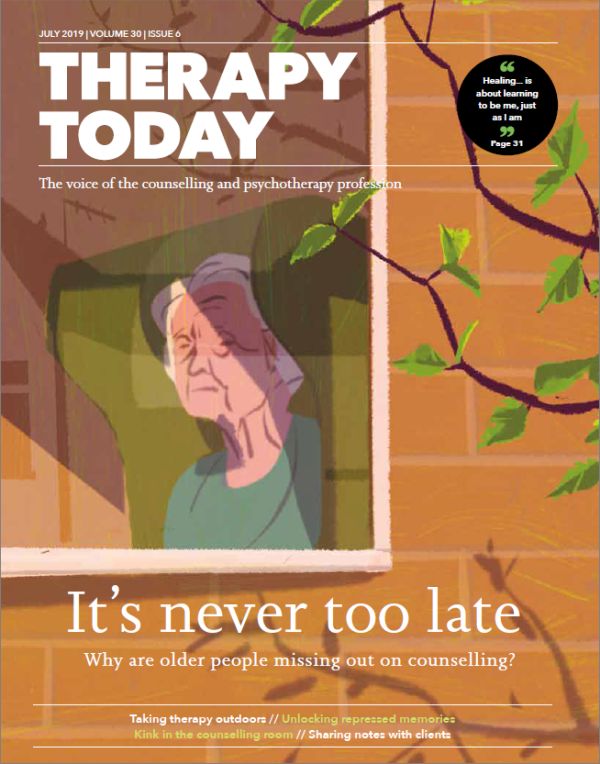In this issue
Here and now
News feature: It's never too late (free article)
Sally Brown explores the challenges of reaching out to older people.
The big issues
A walk on the wild side
Nick Tarrant reflects on what he has learned from working with clients outdoors.
Teaching with heart
Phil Hills and Rachel Lawley are taking counselling for teachers into schools.
Kink in the counselling room
Karen Pollock dispels some myths about kink.
Working with repressed memories
Paola Borella explains how to help clients recall traumatic events safely and therapeutically.
Open therapy
How would it be to share your notes with clients? Anthony Prendergast decided to find out.
Regulars
Turning point
Rakhi Chand draws wisdom from experience
It changed my life
Rachel describes how cognitive analytical therapy is helping her 'learn to be me'.
Talking point
And what do you do?...
Research matters
Where now? In his final column, John McLeod shares his hopes for the future of research in counselling and psychotherapy
Dilemmas
Should I agree to supervising my ex-client’s clinical practice?
Analyse me
Lynne Barnett speaks for herself
Your association
From the Chair
Andrew Reeves on the shadow side of technology

Members and subscribers can download a pdf of this issue from the Therapy Today archive.
Editor’s note
This is Rachel’s and my last Welcome page. From September, BACP senior executive and elected officers will be occupying these slots, in a refresh of the magazine content.
The aim of the refresh is to align Therapy Today more closely with BACP’s activities and your concerns and priorities. We want to ensure the magazine plays its part in keeping you up to date with what your Association is doing on your behalf and what you are doing on behalf of your profession.
We’ll be bringing BACP Round-up to the front to offer a stronger mix of Association and external news. This section will include interviews with members about their activities, successes and campaigns. We will be including more comment from social media on the letters pages, so there’s a wider spread of your views. Dilemmas will be refreshed to focus on topical issues that you are bringing to the ethical help desk and that are coming up within professional conduct complaints. We say a sad farewell to John McLeod and his Research Matters column. New research will be brought into the news pages. And we will be introducing a regular ‘In Practice’ feature on everyday clinical practice issues, to support members just starting out in their counselling career. All of this will, we hope, anchor Therapy Today to your work and your Association.
Meantime, the July issue offers rich reading, not least Phil Hills’ and Rachel Lawley’s description of how they, as newly qualified counsellors, set up and are now taking a specialist counselling service into schools to offer support to the teachers. It’s a story of head, heart and sheer business-mindedness that, as they say, has meant they can work to the values and principles that brought them into the profession.
We break for a month in August, so enjoy your summers, all.
Catherine Jackson
Editor
I find the very elderly to be the most motivated, open and fascinating clients to work with.
There is a feeling of ‘If not now, when? Let’s just do it.’
The 80-pluses are the proud cohort who survived World War 2, who may view counselling as a way to finally come to terms with war traumas or wrongs they suffered, or indeed inflicted on others. More commonly now, it’s the war children who are coming to therapy. Some have attachment issues arising from childhood evacuation or early parental death. Others still live with the trauma of the regular bombing raids, the constant threat of death and the eternal dread of that knock on the door.
There are a lifetime of stories that need to be told and heard, and there’s depression and righteous anger about the here-and-now too – at ageism and the loss of visibility, community, mobility, health, respect and independence. Intrigued? Turn to our feature on counselling older people.
Rachel Shattock Dawson
Consultant Editor
